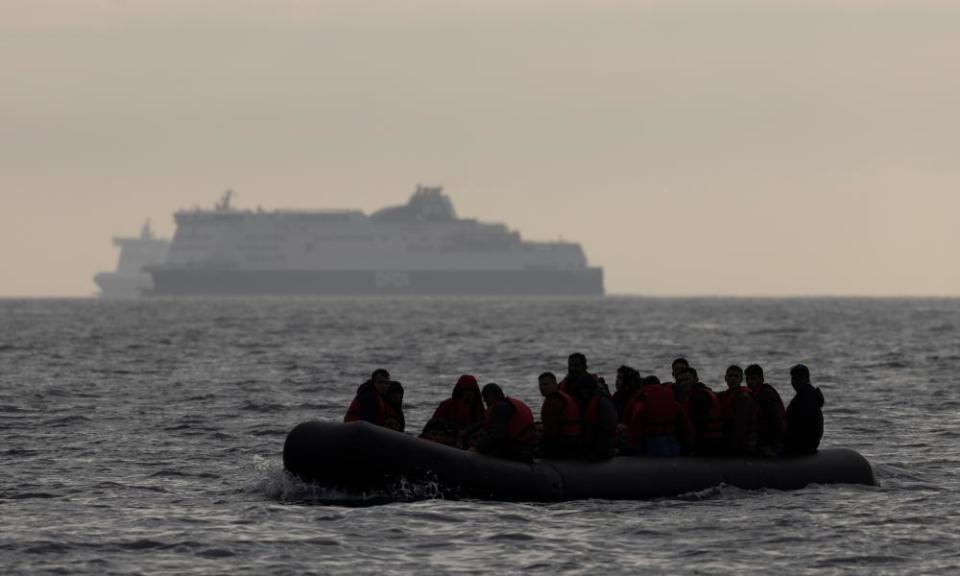Channel smugglers drop prices and cram more people on to boats

People-smugglers have dropped their prices and are cramming more people than ever before into already overloaded, flimsy boats, the Guardian has learned.
This week 696 asylum seekers crossed the Channel from France to the UK in one day, the Ministry of Defence said.
The increased numbers arriving in more overcrowded boats with cheaper crossing prices demonstrate that plans to forcibly remove some asylum seekers who arrive in the UK on small boats are not acting as a deterrent, campaigners say.
Last November, French police quoted a price of about £5,000 charged by smugglers for an individual to cross the Channel, according to reports in the Mirror. Now asylum seekers and non-governmental organisations are saying that prices have dropped to between £500 and £1,000 for a place in a boat.
Until April this year, the government published less detailed data about the number of small boats arriving in the UK from France but official statistics show that in 2018 there were an average of seven people on a small boat, in 2019 an average of 11 people a boat, in 2020 an average of 13 people a boat and in 2021 an average of 28 a boat.
Detailed data from April this year shows a significant upward trajectory, with about 50 people a boat on Monday’s crossings, when 696 people crossed in 14 boats.
While there is some variation in the numbers boarding each vessel, since the announcement about the deal to send asylum seekers to Rwanda on 14 April the trend has been sharply upwards.
From May, and increasingly in June and July, more days show an average number of people in a single boat in the high 40s or even 50. On Thursday 388 people crossed in eight boats – an average of 48 or 49 people in each vessel.
Last year 28,526 crossed, up from 8,404 in 2020 and this year more than 13,000 have crossed, including more than 8,000 since the Rwanda policy was announced on 14 April.
Official reports have predicted that the Rwanda plans are unlikely to succeed, but the government says it is determined to press ahead.
Handa Majed, the founder of the charity Kurdish Umbrella, said there had been a significant change in the way the smugglers in northern France operated since the home secretary announced the Rwanda plans, but she said there was no evidence on the ground that it had acted as a deterrent. She said the smugglers had simply “adjusted” their business model.
“Initially, after the Rwanda announcement was made the smugglers were panicking. So they have cut their prices by half,” said Majed.
“In this area, smugglers are king. They are telling people not to worry about Rwanda. Right now the Jungle [Calais refugee camp] is full and the smugglers are offering much cheaper prices. They are maintaining their profits by cramming more people on to a single boat. The smugglers adjusted to Brexit and now they have adjusted again to Rwanda.
“Even if some smugglers are arrested, others will take their place. Their business model will not stop, it will only adjust. They used to put 30 people on a boat, now it is many more.”
One Syrian asylum seeker told the Guardian that the smugglers had dropped their prices dramatically. “Before it was £3,000 or £4,000 to cross. Now the top price is £1,200 and some asylum seekers are negotiating a price of as little as £500 to cross. Everyone can afford to cross these days. Some asylum seekers are saying to smugglers, ‘Why should I pay you £4,000 to go to the UK when I might end up in Rwanda? I will pay you £500’. Then a deal is struck.”
Related: UK policing and border control infiltrated by war mentality, says report
A spokesperson for the French NGO Utopia 56 said asylum seekers were crossing to the UK more quickly than before, on average spending a few weeks in northern France instead of months as was previously the case.
They said: “The quality of treatment of asylum seekers from the French government is decreasing every day. In Grande-Synthe [Dunkirk] 500 people are living without access to water, and more than 1,000 in Calais living in the street or in small forests. It is left to citizens and NGOs to provide food and healthcare.
“We are seeing new communities in the camps. Before it was mainly Kurdish, Pakistani and Afghan people. We are still seeing people from those countries but also from Ethiopia, Eritrea, Vietnam and Albania. The threat of Rwanda has not changed the thousands crossing.”
A government spokesperson said: “The rise in dangerous Channel crossings is unacceptable. People should always claim asylum in the first safe country they reach, rather than risk their lives and line the pockets of ruthless criminal gangs.
“Under our new migration and economic development partnership with Rwanda, we are continuing preparations to relocate those who are making dangerous, unnecessary and illegal journeys so they can have their claims considered and be able to rebuild their lives there.”
Government sources said they were unable to comment on operational matters.

 Yahoo News
Yahoo News 